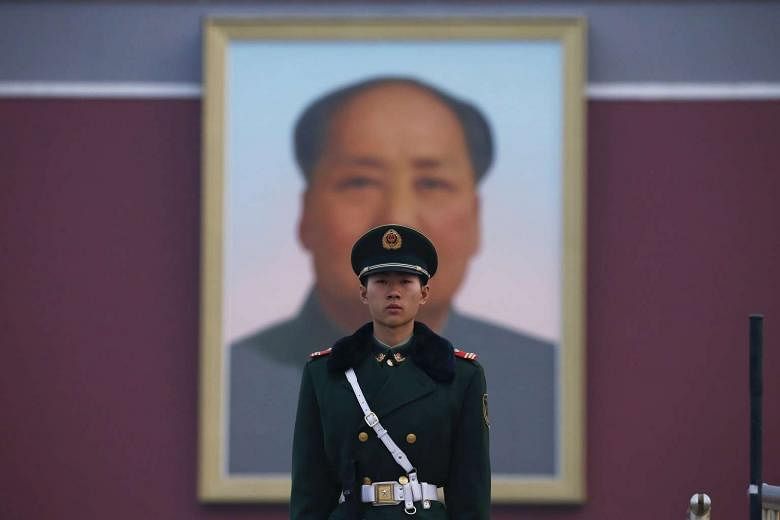Family members of late Chinese strongman Mao Zedong and former Communist Party chief Hu Yaobang have been linked to offshore firms, according to leaked files from a Panamanian law firm that have sparked global protests and investigations.
The two, along with President Xi Jinping, top a list of at least eight current and retired members of the elite Politburo Standing Committee (PSC) who have been linked to the "Panama Papers".
According to the latest disclosures from the International Consortium of Investigative Journalists (ICIJ) which has the documents, Mao's grandson-in-law, Mr Chen Dongsheng, was sole director and shareholder of Keen Best International, an offshore firm set up in the British Virgin Islands (BVI) in 2011.
The files from law firm Mossack Fonseca also showed links to Mr Hu, who was the party's general secretary from 1982 to 1987, through his son Hu Dehua's ownership of a BVI firm set up in 2003.
Former vice-president Zeng Qinghong was another new name listed by the ICIJ, which identified his brother Zeng Qinghuai as a director of China Cultural Exchange Association, an offshore firm.
An anonymous source had leaked some 11.5 million documents to German daily Sueddeutsche Zeitung, which shared them with the ICIJ.
The network in turn studied the documents over the past year with 107 media outlets worldwide.
The ICIJ's first set of findings released on Sunday revealed the offshore holdings of relatives of three Chinese leaders: President Xi, retired premier Li Peng and former political adviser Jia Qinglin.
British broadcaster BBC, which also reviewed the files, reported on Tuesday links to two other members of the current PSC: propaganda czar Liu Yunshan and executive vice-premier Zhang Gaoli. New details of the duo emerged yesterday.
According to the ICIJ, most services provided by the offshore industry can be used for legal purposes and are used by law-abiding customers. But the papers show banks, law firms and other offshore players often fail to follow legal requirements to make sure clients are not involved in criminal enterprises, tax dodging or political corruption.
News of the unfolding saga is censored in China, reflecting the leadership's concerns over fuelling public anger at how powerful families have used offshore firms to hide their assets and evade tax.
Chinese Foreign Ministry spokesman Lu Kang yesterday reiterated that the government would not comment on the allegations involving top leaders.
There had been reports in 2012 of Chinese princelings - offspring of top officials - amassing considerable wealth and power through their family connections. Many are known to have landed plum jobs in state firms. Now, several of them are shown by the Panama Papers to be linked with offshore firms.
Analysts thus say the naming of top leaders in the leaked documents could hurt the leadership's authority and shake the credibility of Mr Xi's anti-graft drive.
Nottingham University analyst Steve Tsang told The Straits Times that the leaked documents, coming from only one law firm, may not be representative of the real extent of the problem. "Those named may be attracting attention at the moment, but who believes that those who have not been named are definitely not involved?"
The Panama Papers named Gu Kailai, wife of disgraced Politburo member Bo Xilai, and outlined how she spawned a complex business web that distanced her husband and herself from overseas assets.
She paid €2.2 million (S$3.38 million) for the Villa Fontaine St Georges in Cannes along the French Riviera in 2001, with funds from her husband's business ally Xu Ming. The monies were passed to Russell Properties, a BVI firm co-owned by Gu and French architect Patrick Henri Devillers, which paid a French firm for the villa.
Gu, who had sought British businessman Neil Heywood's help to manage the villa, was convicted of killing the Briton in November 2011 over a business dispute.
Her case ended Bo's political career. He received a life term for abusing his power to cover up the murder and for graft.
Two weeks after Mr Heywood's death, the law firm transferred ownership of Russell Properties to Mr Devillers, with the ICIJ saying the reasons and timing behind the transfer were unclear.
At her trial in 2012, Gu, who is serving a life term, said she hid her ownership to minimise tax.
"I did not want others to know I had overseas assets," she added.

